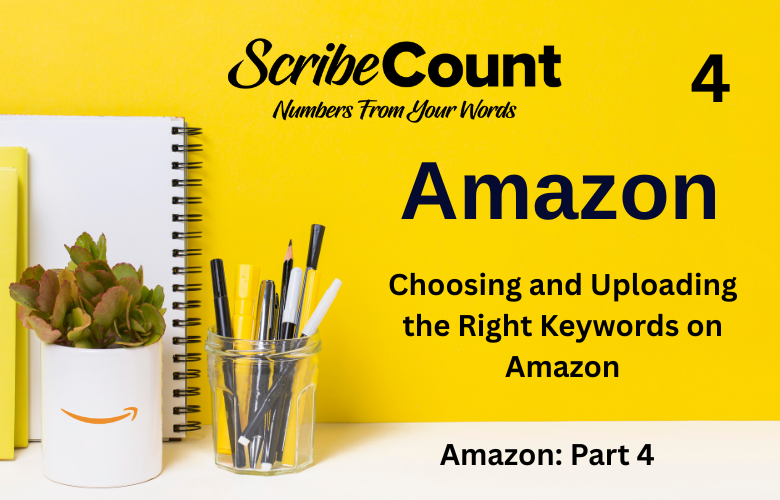Understanding and Using Keywords on Amazon: A Comprehensive Guide for Self-Publishers
What Are Keywords and Why Do They Matter?
Keywords are specific words or phrases that potential readers type into Amazon’s search bar when looking for books. These search terms are critical because they directly influence a book's visibility in Amazon’s massive marketplace. When self-publishers select the right keywords, they increase the chances that their book will appear in front of interested readers. Essentially, keywords act as the connective tissue between your book and your audience—they are how your book gets discovered.
Whether you’re launching a new release or revamping an existing title, keywords play a central role in discoverability. Unlike categories, which classify your book by genre or format, keywords give you a more flexible tool to target themes, settings, character types, emotions, tropes, and reader interests. Done correctly, keywords can help boost organic traffic, support advertising efforts, and even push your book up the bestseller charts. But done poorly, they can bury your title in obscurity or even lead to Amazon warnings.
In this guide, we’ll walk through everything you need to know about keywords on Amazon—from avoiding competing keywords to using AI to generate keyword ideas, understanding category strings, Kindle Unlimited strategy, and more.
What Are Competing Keywords?
Competing keywords are search terms or phrases that are used so frequently across Amazon that ranking high for them becomes difficult, especially for newer or lesser-known books. These are often broad, single-word entries like “romance,” “thriller,” or “mystery.” The competition for these keywords includes traditionally published books, bestsellers, and high-budget marketing campaigns.
To avoid competing keywords, authors should focus on long-tail keywords—specific multi-word phrases that better match a niche audience’s search intent. For example, instead of using “romance,” try “small town second chance romance” or “clean billionaire romance with secret baby.” These have lower competition and higher relevance to the exact reader you're trying to attract.
How Amazon Uses Keywords
Amazon uses the seven keyword fields available to authors when uploading their books through Kindle Direct Publishing (KDP) to help determine where and how a book appears in search results and category recommendations. These keywords help Amazon match your book with customer queries typed into the search bar.
Amazon’s algorithm is built to reward:
-
Relevance to customer searches
-
Sales velocity (how quickly your book is selling)
-
Customer behavior (clicks, time spent, reviews)
The keywords do not need to be repeated in your book’s title or subtitle, but synergy across title, subtitle, keywords, and book description improves discoverability.
Why Deception Should Be Avoided
Using misleading keywords—such as including “Harry Potter” or “Stephen King” to attract attention—violates Amazon’s metadata guidelines. Deceptive metadata can result in:
-
Removal of your book
-
Suspension of your KDP account
-
Loss of royalties
Amazon’s bots and human moderators look for violations, especially in popular or trademarked phrases. Integrity in metadata not only keeps your book compliant but ensures you’re reaching the right readers—those who are more likely to finish, enjoy, and review your book.
The Importance of Researching Your Keywords Before Selecting Them
Choosing keywords without research is like publishing a book without editing—it’s risky and almost always ineffective. Research allows you to:
-
Find low-competition, high-relevance keywords
-
Identify phrases that real readers are actually searching
-
Evaluate which keywords are being used by successful books in your genre
-
Avoid wasted keyword slots on irrelevant or overused terms
Using Amazon’s autocomplete function can help you generate ideas and assess their viability.
Using Similar Books to Find Keywords (Starting with Bestsellers)
A smart way to discover effective keywords is by examining books similar to yours, particularly bestsellers:
-
Start with the bestseller in your genre. Look at the book’s product page.
-
Scroll down to “Product Details” to note the categories the book is listed under.
-
Examine the book’s description and note recurring phrases and tropes.
-
Read reader reviews and questions—the language readers use can be rich with search terms.
-
Use the “Look Inside” feature to see terms or topics emphasized early in the book.
Work your way down from top sellers to mid-list and new releases. This gives a broader understanding of how successful authors in your genre structure their keywords and descriptions.
What Is a Category String and How Does It Relate to Keywords?
A category string is the full path that defines the genre and subgenre of a book in Amazon’s catalog. For example:
Books > Romance > Paranormal > Vampires
Keywords influence which categories Amazon assigns to your book beyond the two you can manually select. If you include keywords like “shifter romance” or “fated mates,” Amazon may place you into niche categories that more closely match your content.
This is why including category-aligned phrases in your keyword fields increases the chance of being shown to the right audience.
To view full category strings, tools like Amazon’s Browse Categories help visualize them.
How Many Keywords Amazon Allows and Their Required Structure
Amazon allows authors to input seven keyword fields, each up to 50 characters. These fields are not visible to customers but are used by Amazon’s internal algorithms.
-
Do not repeat keywords across fields or include words already in your title or subtitle.
-
Use phrases rather than single words when possible.
Keyword Structure and the Role of Commas
Amazon’s algorithm treats spaces as separators, not commas. Commas are unnecessary and can reduce keyword performance. Instead of typing:
romantic, suspense, mystery
Use:
romantic suspense mystery
This allows Amazon to match combinations such as “romantic suspense,” “suspense mystery,” or even “romantic mystery” more flexibly.
Kindle Unlimited’s Impact on Keyword Strategy
Kindle Unlimited (KU) is Amazon’s subscription service for readers. Books enrolled in KU get special visibility and promotional opportunities, such as inclusion in KU-specific recommendations.
Authors in KU benefit from targeting keywords that:
-
Appeal to voracious readers
-
Match popular binge-worthy subgenres (e.g., "reverse harem academy fantasy," "small town romance series")
-
Emphasize “series,” “saga,” or “episodic” in keyword strategies
Since KU readers often explore by genre or theme and consume multiple books per month, optimizing for read-through potential can increase page reads and royalties.
How Traditional Publishers Impact Keyword Competition
Traditionally published books often dominate broad categories and highly competitive keywords due to:
-
Bigger marketing budgets
-
Professional metadata teams
-
High-volume traffic from outside Amazon
This creates keyword congestion for terms like “psychological thriller” or “gritty detective noir.” Indie authors must use this information to position themselves strategically with more specific phrases like “female-led psychological thriller with unreliable narrator” or “slow-burn mystery in small town.”
How AI Can Assist Keyword Creation from a Synopsis
Artificial Intelligence can quickly extract relevant phrases, genre identifiers, and themes from a long synopsis and turn them into optimized keyword suggestions.
Sample Prompt for ChatGPT:
“Analyze the following 300-word book synopsis and generate 20 optimized Amazon KDP keyword phrases that reflect genre, audience intent, tropes, and themes, avoiding overly competitive or trademarked phrases: [paste synopsis here].”
This saves time and provides diverse, tested options for experimentation.
Step-by-Step: How to Select and Upload Keywords to Amazon KDP
-
Write or paste your synopsis into ChatGPT and use the prompt above to extract keywords.
-
Visit Amazon.com and start typing relevant genre terms into the search bar. Record the autocomplete suggestions.
-
Browse bestsellers in your genre and collect recurring language, themes, tropes, and phrases.
-
Use Publisher Rocket or KDSpy to analyze keyword competition, traffic, and earnings potential.
-
Assemble your top 7 long-tail keyword phrases, prioritizing low competition and high relevance.
-
Remove duplicates and exclude title words already in your metadata.
-
Paste each phrase into a separate keyword field in KDP, with spaces—not commas.
-
Check against Amazon’s Metadata Guidelines here.
-
Save and publish/update your book.
-
Monitor performance weekly and revise every 30–60 days.
Examples of Effective Keywords
For a cozy mystery set in a bakery:
-
“cozy mystery bakery owner amateur sleuth”
-
“small town culinary whodunit with recipes”
-
“baking mystery series female sleuth humor”
For a sci-fi space opera:
-
“galactic empire rebellion space fleet war”
-
“science fiction space opera with politics”
-
“alien invasion epic space adventure”
Step-by-Step: Exploring, Evaluating, and Choosing Keywords
-
Explore: Use Amazon search autocomplete and analyze bestselling books for inspiration.
-
Evaluate: Use tools like Publisher Rocket to assess search volume and competition.
-
Narrow down: Eliminate phrases with too high competition or vague meaning.
-
Test: Update keywords periodically and monitor ranking/sales for impact.
-
Refine: Replace underperforming keywords with new or more specific ones.
Final Thoughts: Amazon’s Interface and Importance of Reevaluation
Amazon’s KDP interface is user-friendly and intuitive. The platform’s keyword fields are simple to access, edit, and update—even after publication. Each change can take a few days to reflect, so authors should plan updates around promotions or launches.
Most importantly, keyword strategy is not one-and-done. Genres shift, reader tastes evolve, and what worked in January may be stale by June. Continuous reevaluation ensures that your book stays visible, relevant, and competitive in an ever-changing marketplace.

